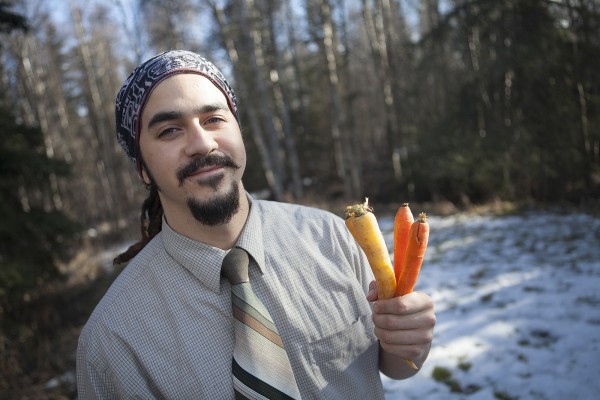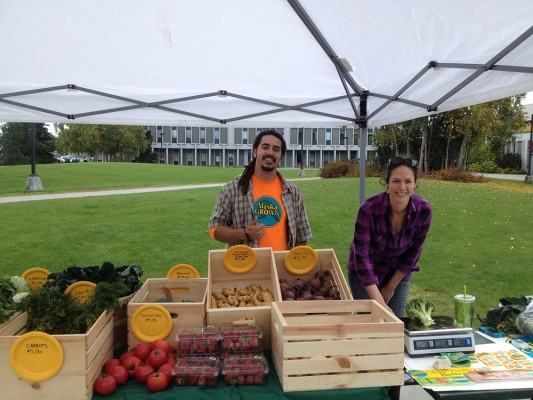UAA student, alumna offer local veggies on campus
by Tracy Kalytiak |

UAA student Devin Johnson, pictured, and UAA alumna Kyla Byers offer fresh produce on campus Thursdays. Byers' company, Arctic Harvest Deliveries, gets the produce from Matanuska Valley farmers. (Photo by Philip Hall / University of Alaska Anchorage)
Devin Johnson is truly "Alaska Grown": He grew up near Palmer, and eating local has always been part of his life. "I have vivid memories of picking peas right off the pod, and gathering potatoes right in our backyard," the UAA student said.
UAA alumna Kyla Byers, on the other hand, never thought about where her food came from until she spent time in Australia about 10 years ago. "I didn't study or grow food in Australia, just became more aware of where my food came from and a more healthy way to eat while I was there," she said.
Now, Byers is cultivating Arctic Harvest Deliveries, a business that connects farmers with consumers by distributing bags of fresh vegetables, via subscription, to people who value eating healthy, local food. Byers' Arctic Harvest Deliveries also provides local carrots, greens and other fresh fare to restaurants and to an on-campus produce stand Byers and Johnson run Thursday afternoons in the Social Science Building.
"Everybody needs food, it's something you eat, you're nourishing your body with it, so it's a pretty important part of people's lives," said Byers, who has previously received UAA Center for Community Engagement and Learning assistance for projects exploring the health and social value of local foods. "With loving to grow food, I just know how I connect with my food when I grow it and get to pick it out of the ground and eat it right away. I feel a really strong connection with it, want other people to get the same sense, and support our local farmers."
'Doing some awesome things'
Byers and Johnson are among a growing number of people in the UAA, Anchorage and Alaska communities that have discovered just how powerfully locally grown foods can transform lives.
Tomatoes plucked from vines in a local farmer's greenhouse, or carrots and potatoes pulled from Matanuska Valley fields taste more succulent than most fruits and veggies found in grocery stores that hail from other states (or even other countries) and come from varieties hardy enough to withstand days or weeks on a ship or truck.
Local foods contribute more than simply great taste.

Devin Johnson and Kyla Byers sell produce on the UAA campus last year. Now, they sell it Thursday afternoons, 1-4 p.m., in the Social Science Building. Byers' company, Arctic Harvest Deliveries, provides the produce, which is grown by farmers in the Matanuska Valley. (Photo courtesy of Devin Johnson)
Community gardening projects, UAA's Dr. Rebecca Volino Robinson has said, help Anchorage's refugees by giving them an opportunity not only to provide food for themselves, but to contribute socially by using agricultural and marketing skillsets they already have and growing relationships with others in Anchorage and Alaska.
The Alaska Food Policy Council last week hosted the Alaska Food Festival & Conference at UAA. Friday's conference in Lucy Cuddy Hall featured sessions about understanding and addressing food insecurity; the connection between public health and hunger; indoor growing in Alaska; supply chain management for perishables in Alaska; accessing local foods and building a food business in Alaska.
People attending the conference ate delectable cuisine (using food Byers provided) that Chef Kirsten Dixon of Tutka Bay Lodge and Winterlake Lodge prepared for the event.
And a festival the following day featured food trucks, garden activity tables for kids, goat-milking and cheese-making demonstrations, DIY information about beekeeping and fermentation, and ice cream made from Havemeister Dairy cream and add-ins from local farmers.
Thomas Cappiello, a Palmer resident and longtime gardener who works in Anchorage, visited the Cuddy event during his lunch break Friday. "I feel that Alaska has a greater potential for local sustainable agriculture," Cappiello said. "It's doing well now, but I see more potential, so I like to support that effort."
Dr. Elizabeth Hodges-Snyder serves as an AFPC board member, works as an assistant professor of public health at UAA and is an Arctic Harvest Deliveries subscription customer.
"I'm one of several UAA faculty members who pick up giant clear bags of produce from Kyla," Hodges-Snyder said. "I think Kyla and Devin are doing some awesome things. We provided a little bit of fiscal sponsorship for the produce stand; we're happy he's continuing it. And Kyla had a table at the conference. We're eager to continue supporting UAA students doing good work with food."
Both Johnson and Byers took civic engagement classes while studying at UAA, and Byers earned a certificate in civic engagement along with her bachelor's degree, according to Judith Owens-Manley, director of the UAA Center for Community Engagement and Learning.
"The connection to food and eating local food is just one of many subjects students may focus on locally, nationally and globally when learning about their communities and community issues in civic engagement classes," Owens-Manley said.
Johnson is a member of the UAA Sustainability Club, whose other members volunteer at the produce stand each week.
"Devin...with the help of David Weaver (the Sustainability Club's adviser and director of Housing, Dining and Conference Services) has done an amazing job in creating a partnership between the Sustainability Club and Kyla's Arctic Harvest Deliveries," said Kelsi Swenson, former president of the Sustainability Club, who is now operations coordinator of the UAA Learning Resources Center. "[The club] has been working for years to bring local food to campus."
'They loved it!'
Johnson first heard about Byers' business last year when he was trying to decide what to do for an undergraduate research project.
"After finding out that her business delivers fresh produce from the Valley to restaurants in Anchorage, I thought, 'Why not UAA?'" he said. "This is when the light bulb went off in my head to start a produce stand at UAA featuring produce from Arctic Harvest Deliveries. This would be a pilot study to assess the demand for Alaska Grown food here at UAA."
All the produce originates from local farms out in the Matanuska Valley; Arctic Harvest Deliveries transports it to Anchorage.
Johnson says the stand received an enthusiastic welcome. Due to the success of the pilot study, he'll continue running the produce stand on campus for the 2016 spring and fall semesters.
"Hopefully, future success of the stand could lead to a permanent food option on campus," he said.
He added that students, staff and faculty all bought produce from the stand, a convenient option for students living on campus without easy access to a car they can use to get to an off-campus grocery store or farmers market.
"After the study ended, people continued to call the Student Union info desk to ask where the produce stand is," he said. "They loved it!"
Written by Tracy Kalytiak, UAA Office of University Advancement
 "UAA student, alumna offer local veggies on campus" is licensed under a Creative Commons Attribution-NonCommercial 4.0 International License.
"UAA student, alumna offer local veggies on campus" is licensed under a Creative Commons Attribution-NonCommercial 4.0 International License.









